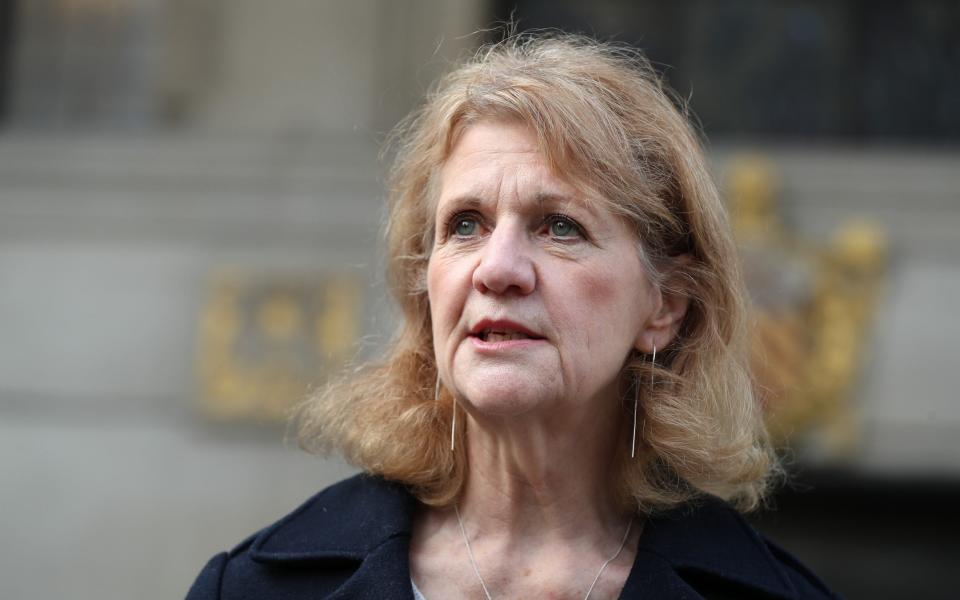Police lost bodycam footage of late ITV journalist warning of domestic abuse

Police investigating the domestic abuse claims of a television journalist who was later found dead had lost vital body worn video recordings and failed to inform her of her former partner’s violent history.
Teresa McMahon, a producer for ITV, suffered physical abuse in the months leading up to her death, including broken ribs and fingers.
She had ended the relationship, but accused her former partner of trying to pressurise her into resuming it, leading her to ask Greater Manchester Police (GMP) details about his history of violence.
However, officers refused to disclose whether he had a criminal record, saying that because she was no longer in a relationship with him, she had no right to see it.
A police body camera recording of the interview, in which she relayed her fears to officers, was subsequently lost.

The family of McMahon, who was found hanged at her flat in Salford in Aug 2021, have said she might still be alive if police had investigated her case properly.
The Independent Office for Police Conduct (IOPC) has now ordered GMP to reinvestigate a complaint submitted by her aunt about the force’s handling of its investigation into her niece’s case, saying it “was not reasonable or proportionate”.
Baroness Hughes of Stretford, the former deputy mayor of Greater Manchester, expressed concern at the loss of the body-worn video footage and asked the force’s chief constable for assurances that such failures are not a regular problem.
Lorna McMahon told The Telegraph: “My niece’s death could have been avoided had GMP acted differently. Lessons need to be learned. She was failed by the police who should have been helping her.”
‘Police discouraged victims from pursuing complaints’
The apparent failures in Teresa’s case came after an audit by Baroness Hughes last year found that police officers were captured on their own body-worn cameras encouraging victims of domestic abuse not to pursue their complaints, and failed to carry out basic enquiries.
Footage was audited after a series of police inspectorate reports criticised GMP for its record on domestic violence, including the high numbers of victims who had withdrawn their support for prosecution.
Teresa had submitted a complaint to police via email a month earlier about her former partner’s “controlling, manipulative” and bullying behaviour.
Following the initial email, the 43-year-old, who worked as a producer and news editor for ITV’s Granada Reports programme, was assessed as “low risk” and suitable to be dealt with via a domestic abuse appointment.
However, this was cancelled owing to what police described as “resourcing issues”.
When officers eventually visited her home nine days later, on July 21, Teresa told them that her former partner had recently broken her fingers and had left her with broken ribs the previous October.
However, a case against the man was not pursued after police said Teresa declined to support a prosecution, fearing it would place her at risk of what she told police might be “further issues”.
Victim was refused records on violent partner’s past
She did, however, ask the officers for details of her former partner’s convictions under the Domestic Violence Disclosure Scheme (DVDS), known as Clare’s Law, saying that two other women had told her that he had a history of violence.
Officers told her that she was not eligible for the information as the scheme only allowed details of convictions for domestic violence to be shared with an offender’s current partner.
Lorna McMahon said: “If police had revealed details of his record, it might have helped strengthen her resolve to stay away from him for good.”
In its investigation, the IOPC found that this refusal to share the information was a mistake.
The watchdog stated: “The DVDS guidance stipulates that the scheme applies to former partners, as well as current partners. Accordingly, this could be revisited and considered as part of the reinvestigation.”
The IOPC added that officers may have also failed to consider whether McMahon was afraid of “repercussions or experiencing coercion and control” when she told them she did not want to proceed further with a prosecution.

Details of the conversation with police at Teresa’s home should have been recorded on the officer’s body-worn video camera.
However, when a senior officer began investigating her aunt’s complaint about GMP’s handling of the case, it emerged this had been lost or deleted because of a “system fault”.
Baroness Hughes said in a letter to Lorna McMahon last week, shortly before leaving her post as deputy mayor: “I will raise my concerns with the Chief Constable regarding the capture and retention of body-worn video to seek some answers and assurances that system errors are not regular occurrences… and for lessons to be learned where possible.”
In a pre-inquest review, Timothy Brennand, the senior coroner for Manchester West, said that Teresa was a “vulnerable individual” who was “locked in a coercive and controlling relationship”. A full inquest is to be held later this year.
GMP said it was unable to comment as the matter had been sent back to them by the IOPC for reinvestigation.

 Yahoo Movies
Yahoo Movies 